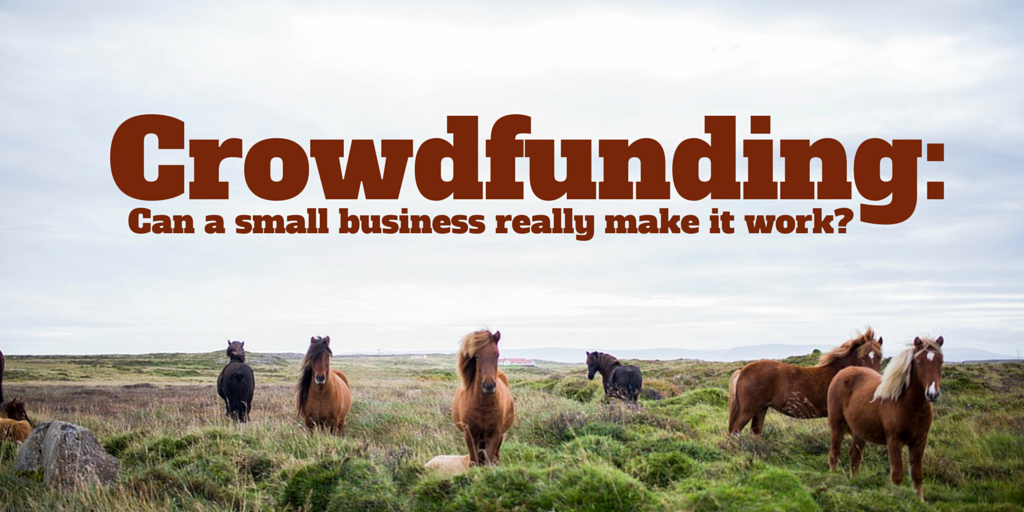Crowdfunding – Can a small business really make it work?
It’s no coincidence that with the number of people starting up their own business rising, so the number of alternative finance options is expanding. Last year, a government report cited a lack of access to finance and day to day cash flow issues as two of the biggest hurdles facing small businesses in the UK.
With traditional banks often reported as being unsupportive of small businesses, many are looking to alternative finance to help kickstart their businesses. Probably the trendiest of these is crowdfunding, effectively pitching to the world and inviting people to pledge money to help fund your project collectively and even for a small business it is a viable option worth considering.
Types of crowdfunding
There are two main types of crowdfunding – donation and investment.
Donation crowdfunding

If you are aware of crowdfunding it is probably the donation crowdfunding you immediately think off and in particular reward crowdfunding. Sites like Kickstarter have brought the concept to a wider audience where donors are invited to pledge money in return for gifts or products – perhaps a first prototype of a product or a signed script from a film or even just a social media mention for small contributions. All of these donations added up help crowd fund the overall project. Charitable giving campaigns also fall under the donations crowdfunding definition, so you may have been part of crowdfunding for longer than you thought. Donation crowdfunding is just that a donation. No shares, equity or any real say in the project is ever given; donors are simply donating money towards that cause. As such business use thus far has been limited mainly to creative projects that capture the imagination of would be donors.
Investment crowdfunding
 The other type of crowdfunding, investment crowdfunding, offers far more potential for a business, large or small and is accessible in two main forms. Crowdfunding lending – also referred to as peer to peer lending – effectively pools money from many would be investors in the form of a loan. Investors do so on the basis of a promise of repayment over time of their capital investment with the addition of interest. It is estimated that nearly £200million was lent via crowdfunded lending in 2013 and the figure continues to rise through sites like Funding Circle. In practice, it is traditional lending, cutting out the middle man. Rather than investors investing their money in banks for the banks to then choose where to invest, the investors pick and choose their own investments with their own money often giving a greater degree of flexibility.
The other type of crowdfunding, investment crowdfunding, offers far more potential for a business, large or small and is accessible in two main forms. Crowdfunding lending – also referred to as peer to peer lending – effectively pools money from many would be investors in the form of a loan. Investors do so on the basis of a promise of repayment over time of their capital investment with the addition of interest. It is estimated that nearly £200million was lent via crowdfunded lending in 2013 and the figure continues to rise through sites like Funding Circle. In practice, it is traditional lending, cutting out the middle man. Rather than investors investing their money in banks for the banks to then choose where to invest, the investors pick and choose their own investments with their own money often giving a greater degree of flexibility.
The final alternative in this sector is equity crowdfunding. A smaller sector at present but expected to become more important – especially in the small business world – as traditional bank lending becomes more restrictive and more and more people become aware of the model, coupled with increased protections for investors with improved government legislation. Quite simply investors invest money in return for share capital in the business being invested in. Again there are variations on how equity crowdfunding works in practice. Some investments offer a direct ownership structure, whereby each individual investor takes independent shares, others opt for a nominee structure whereby a group of shares are held on behalf of the crowdfunding investors. Funding via business angel networks such as Angels Den is an example of equity crowdfunding.
As with all aspects of running your business, before leaping into changes you may not fully understand it pays to do some research and see how these options work in practice. Take a look at the various crowdfunding platforms and see how others are seeking investment. Importantly also take a look at what projects seem to be successfully funded and try to understand why. Different platforms and different approaches could limit your potential investor.
In terms of donation crowdfunding, most small businesses can probably set about launching their own campaign using one of the existing crowdfunding platforms without too much help. However, investment crowdfunding is likely to have a larger impact on your business and how it runs so it is always advisable to seek professional help of an accountant and / or lawyer who can highlight any potential risks specific to your business you may not have considered.
Ahead of that, you should also consider the basic positives and negatives of looking at a crowdfunding option.
 The positives
The positives
Built in advocates
Possibly the biggest advantage of a crowdfunding solution is the marketing spinoff. Even if funding is limited to ten investors, that is likely to be ten investors who previously were unaware of you. Now they are very aware and very keen for you to succeed so also keen to promote what you are doing. In the era of social media that can help extend your brand awareness by multiples only extensive marketing budgets could previously reach. Now you can reach potential new customers with no cost of outlay thanks to the investors who are putting money into your business. Making it easier for those investors to spread the word is important so provide them with some shareable content and look to drive traffic back to your website through their enthusiasm to be a financial backer.
Quicker funding
Traditional bank applications can take weeks if not months from first contact to final drawdown of money if finally approved. With cash flow often a reason for seeking finance for a small business, these timescales are unhelpful and unrealistic – especially if the answer from the lender is a potential no. Via crowdfunding you’re likely to get your money in weeks, rather than days, depending on how you set your targets and how popular an investment you appear to be. With money usually provided in a single tranche too, putting your business plans into action should be easier and swifter via crowdfunding.
Less red tape
Banks are paperwork heavy. In a way that is reassuring as it is effectively other people’s money they are dealing with, but as a small business owner under pressure, filling in lengthy forms and supplying extensive business plans and accounts is resource intensive and stressful. Crowdfunding is about getting people to believe in your idea if you want funding. That’s not to say you don’t need to prove it is viable business proposition, but the paperwork and proof you need to supply is far less onerous than an application to an institutional lender.
 The negatives
The negatives
Something new
Probably as a small business you have surrounded yourself with a few trusted friends and family who you use as a sounding board for big business decisions. The experience of others can often save you the expense and distress of making the wrong decision. The problem with crowdfunding is that being so new few of those in your support network will have direct experience. That risks any advice being tainted by their own fear of the unknown so keep that in mind when considering their feedback.
Sharing your idea
The majority of small businesses successful in the crowdfunding arena do so to fund new projects or expanded ranges of their existing offerings. In going to the public crowdfunding arena before these are underway you risk tipping off potential rivals of your intentions and if your proposal document is any good, risk highlighting the long-term benefits and financial rewards of the project to anybody else with the wherewithal to give it a go. In reality, having come up with the idea and put together a pitch for crowdfunding you are probably better placed than anybody else to make it happen so you have the advantage, but it is another reason that a well prepared and thought out proposal is key so that if the opportunity arises and it is funded you can get to putting the plan into immediate action and see off any potential competition.
Commission and fees
Maybe not a strict negative but crowdfunding will come at a financial cost, often at a percentage of the funds raised, so make sure you have that covered in your overall calculations. If you choose to use one of the existing crowdfunding platforms to help promote your project and request for investment, check out their terms and conditions. Many insist that your project is fully funded to your pre-set target before you can receive any money – unfulfilled targets just fall by the wayside. Others won’t allow funding above your pre-set target, whilst some will let you add additional fundraising options once targets are met. Check too, the charges that the platform will make for a successfully funded project – some may also charge for unsuccessful projects so be aware – and check when these fall due and how they are to be paid.
So can a small business really make crowdfunding work? Of course yours can, it just needs a bit of planning and research before taking the plunge. Take a look at Business Agent which is an aggregator of various forms of mainly investment crowdfunding platforms and you will see there is much variation in what they offer and how they work. Make sure you understand your chosen one and that it is right for your business. Seek professional advice and observe how others use the various crowdfunding options. Being prepared won’t harm you but not being prepared will. As is often seen on TV programmes like Dragon’s Den those who clearly know their business and the proposal in hand inside out are the ones who are more likely to gain investment. If you don’t appear to have a firm grasp on it or your proposal lacks real substance you will be found out and any potential investor will be worried about your true commitment and your worth for their money.
We’ll be following up in coming weeks with real examples of small businesses that have gone down the crowdfunding route. If you would like to be featured or have something to add, please leave your comments below.

